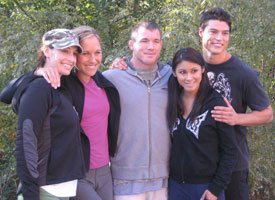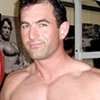Ashley Borden: the name is synonymous with physical performance results, and advanced body transformation. Excellence: what Ashley strives for when aiming to take her clients' health and fitness goals to new heights and what her clients themselves have come to expect from Ashley. And results and excellence are probably responsible for the LA fitness guru and body transformation specialist's reputation and success as a celebrity personal trainer.
Traditionally a population with high aspirations and standards, the celebrity crowd are, as would be expected, an exceedingly challenging group to work with. As their careers either live or die based on how they look and perform, it is Ashley's job to ensure that each of her clients' enjoys longevity and prosperity as an entertainer, a role she never tires nor fails at.
In an industry where you are hot one day and not the next, each celebrity Ashley guides seeks her out specifically, to help keep them at the relevant end of the entertainment spectrum.
But what separates Ashley from the thousands of personal trainers currently expanding into the celebrity market? For one thing she has 17 years experience training a wide range of people, from the housewife to the elite sporting-star.
Then there is her personal battle with eating disorders that have, understandably, given her a strong sense for helping others and the experience necessary for turning negatives into positives. And this goes to the very heart of body transformation.
By its very nature, a body transformation necessitates a strong will to overcome some kind of physical flaw, whether largely perceived as in the muscular bodybuilder who sees himself as being small, or startlingly real as in the overweight housewife in dire need of an effective fat loss program.
Regardless of how extreme, any body transformation requires professional intervention from one who has both the experience and the desire to really help, to make a difference and to facilitate positive change. This is what separates Ashley from the pack and makes her the best in her field.
With almost 20 years experience as a trainer, Ashley has learned many lessons. As a celebrity trainer she has had experiences most of us mere mortals can only dream about. In the following Bodybuilding.com interview she shares her knowledge and her experiences.
Q. How long have you been a personal trainer Ashley?
I've been a personal trainer for 17 years.
Q. Was celebrity personal training a gradual progression for you or was this something you started out doing?
No, since I started my training business it (the celebrity training) has just been an ongoing progression. A lot of celebrity training has to do with living in the town where the action is happening so it just happened through referrals. I was just working at the gym and they had someone come in. It was a referral and then it was all basically word of mouth from there, especially in the entertainment industry.
Q. Who was your first celebrity client?
My first celebrity client was Sean Hayes who was on Will and Grace. We worked on building muscle. I put about 17 pounds of muscle on his frame and we trained the whole off-season (when not filming) and he got so muscular and looked so good the producers were horrified that he was so big. And they were, "You know what, he is too muscular." I was, "You don't have to hate on it; you can make him look skinny and scrawny." But he was great; he and I worked very well together. He is one of my dearest friends here.
Q. When he first began training with you he was training specifically to get big for another role or for personal reasons?
No, he was on Will and Grace and he just had a goal. He wanted to get bigger and stronger. At the time we were actually doing the Body for Life program together—he is incredibly strong and just ate well. It was just a goal he had. And we did it together.
Q. And he dropped his body fat correspondingly?
Absolutely!
Q. Was this the first time Sean Hayes had trained specifically for muscle size?
No, he had a trainer before at the same gym. He left his trainer and came and worked with me.
Q. I understand you also worked with multiple UFC (Ultimate Fighting Championships) Champion, Matt Hughes. What specifically did you do with Matt?
I actually did not manage his training; I managed his food.
Q. You were his nutritionist?
Well, I am not a nutritionist nor am I a registered dietician, but I still handle many people's food intake, depending on what their goals are. I call this role the food manager. Basically, with Matt, what we discovered was he was eating more like a bodybuilder than an endurance athlete.
Matt already ate great; I mean he didn't eat bad food. He's not a sugar eater; he's a very clean eater but part of it was he needed to eat way more low glycemic carbohydrates.
When he was training for a fight he was losing up to four to six pounds (bodyweight) a workout so he really needed to make sure he was not burning muscle, and that he was burning up carbohydrates, that he was not consuming at the time. So we just tweaked his ratio of carbs to protein to fats and educated him a little bit on what carbohydrates would really be good for him to eat, that would give him sustained energy.
Part of it is that Matt was already incredibly strong but part of the issue was he would not get his second wind until late into his workout; he would start to really feel strong then. Which is great but the problem was he was eating into his muscle. And he didn't realize the difference. So we changed his post and pre-workout drinks, and his carbohydrates, and put him on Udo's (Choice) Oil and he went great.
Q. Just to clarify, what benefits did Udo's Oil give Matt?
Udo's (Choice) Oil is a pure blend of a 2:1 ratio of omega 3 and 6 essential fatty acids; it is in a glass bottle and it is made from an incredible company that is based out of Canada. The oil helped with recovery; it helped to load more lean muscle tissue on him and he took it pretty consistently. That was something that he changed.
He also works with Nutritox, which has great products as well. So he was on a really good combo of the right amount of supplements without overdoing it and also getting most of his nutrition from real foods, which is what he prefers.

 Click Image To Enlarge.
Click Image To Enlarge. Ashley, Jennifer Galardi, Matt Hughes, Lauren Kim, Alan Jouban.
Ashley Was The Technical Director/Assistant Director For Matt's Plyomix Fitness DVD
The Other People Were The Talent In The DVD.
Q. So prior to you managing Matt's nutrition, he already had a good diet but just needed to make a few subtle changes, nothing too drastic.
Yes, absolutely. He just needed to change his carbohydrate ratio and understand what carbs, from low to moderate, were the good ones for him to have as opposed to high glycemic carbohydrates.
Q. What were Matt's measurable results?
Matt never, ever complains and never whines or anything about feeling tired or sore. So his thing was really the sustained energy throughout his long training. He splits his training throughout the day and he was just able to do it and he wasn't having the bonking as much. He wasn't hardcore bonking; it was just a matter of having more sustained energy for him throughout his whole workout.
Q. Did his performance in the Octagon improve?
I don't know really. Another thing: Matt didn't eat enough greens before and I think he became a real broccoli man so that was good. He was not big vegetable eater and we really tried to get him to eat a lot more green vegetables so he would have more good fiber and carbs. I think he felt a lot better after doing this. We also took away his red meat during his training phase.
Q. He would have got his creatine and iron from supplements?
Yes, Nutritox took care of that.
Q. When you are working with a bodybuilding athlete versus a mixed martial artist, would you tend to increase protein and decrease carbohydrates?
Well, I think it depends. If it is someone who is really in competition, for the art of being absolutely as lean as possible, I would hand that off to somebody who is an expert in that area because that takes a lot more specific science; to get somebody to three percent body fat.
Q. Do you specialize more in body transformations?
Yes, absolutely—body transformations and also getting the job done. For instance when Matt and I were in Hillsborough, avocados were really out of season. But we went to this Mexican food restaurant and I said, "Lets just ask the manager if they get shipments of avocados from somewhere else, lets see if they can get you a whole crate of them." And it is just where if the athlete doesn't have it they won't eat it.
Matt had so many other things to worry about. It is kind of like I make sure they have all of their supplements, and all the foods they need so they have the least amount of things to think about. They can then just consume the food and worry about their training.
Q. You mentioned avocados a moment ago. I have found with my own clients that using avocados as a healthy source of fat is an excellent idea as it really fills the individual up and satiates them while providing valuable nutrients.
You know what, it is great. I have really found that there is a fat shortage. People with their diets are like, still living in the '80s and not eating any good fats. And I really found that increasing your good fats, especially from avocados, supports a host of health benefits, and it's also satiating for people who maybe psychologically love butter or cream cheese or spread: they can use avocado as a spread and the texture of it is really creamy and good and it helps to satiate people who might be used to a certain taste. It is a great alternative to bad fats.
Q. As far as training goes, do you have a specific approach for all males who want to gain as muscle mass as possible or do you design each program based on the individual's personal requirements?
Every single one of my clients, whether they are professional athletes or a stay at home mom, all learn the same basic system which is basically called the LIFT system (Lift Integrated Systematic Training) and that way I approach everybody, bodybuilder or non-bodybuilder, in a way that assesses the body in the most aesthetically correct way.
I start with them taking their shoes and socks off and I look at the arches of their feet when they are standing in a neutral position. So I start from there and depending on how the arches look, this will give me a compete map of the chain of the rest of their body.
If somebody comes to me and says, "I can't get my back and triceps up or my rear deltoids just won't develop," the chances are they have probably more a collapsed arch and they have forward head carriage and they are not even aware of it. And they are not posturally aligned. The training that I do really focuses on all of the postural stuff, the postural muscles and the whole kinetic chain; very biomechanics-based.
Editors Note:
One of the most prevalent postural deviations is called anterior head carriage (or forward head carriage) and is usually the result of sitting for prolonged periods with the head tilted forward (as in sitting at a computer desk all day long).
Mothers who breastfeed or parents in general who spend time leaning forward to attend to their infant or child also experience this problem. This problem causes excessive neck strain and can seriously affect everyday movement and performance. It can be corrected with the help of a professional like Ashley Borden who teaches correct postural alignment.
Q. That's a smart approach.
And I incorporate a lot of myofascial release, a lot of that.
Q. Can you explain this concept further?
Myofascial release is, in layman's terms, is a very deep tissue massage, basically. For instance I worked on Matt when his shoulders were feeling tight. There is a way of working certain pressure points, and moving the muscle around releases the muscle so it becomes more open and stringy and more blood flows through it.
So when you go to train you haven't just stretched a tight muscle with a lot of muscle adhesions, you have actually opened up the muscle and all the tissue. So then when you stretch it, it is able to stretch in a healthier manner in the tissue rather than making the knot tighter so it won't stretch. It's great.
I do it with all of my clients and most of them use a PVC pipe as opposed to the white foam rollers that a lot physical therapists use. I go a little bit deeper than that and like to use a PVC pipe. It's an integral part of the system (LIFT), the training session as well. They "roll out" for about ten minutes before they train.
Q. It sounds like you could actually change the shape of a muscle through myofascial release.
Absolutely. I mean quicker than anything I've ever witnessed in my life. It's great for body changing.
Q. With a biceps peak, for example, through this method you could free up the muscle belly itself to promote additional growth.
Exactly. And for somebody who has a really tight biceps, they are not going to be able to really get their triceps to fire or become more sculpted. So you have to release the biceps so they can fire or contract the triceps.
Q. Moving onto some of your other celebrity clients, what did you do specifically to improve the shape of Christina Aguilera and Mandy Moore in terms of both diet and training?
I trained Christina for about three and a half, four years, stopping two years ago. I went on tour with her and trained her in LA; also did her Stripped tour with her.
When I started working with her she was very young and had a naturally skinny body, and Christina really wanted to work on her strength and training. And she was more reluctant about her food, so over the course of time it was really just educating her in more of a passive way—how changing her food will affect her stamina onstage.
If she wants she will be able to perform a lot longer and not feel like she will crash from it. When they got the menu for the venues I would look to see what food would be in there. I would then change things to make sure that we had turkey slices and vegetables as opposed to just Doritos and Jolly Ranchers.
Q. That sounds like a full-time job for you?
Well, it was a full-time job (laughs).
Q. So you would put all of your other clients on hold while you dealt with Christina? Is that how it worked?
If I was touring with her, I was with her 24/7. When I was at home (in LA) I was seeing her four times a week.
Q. What strategy did you use with Mandy Moore?
With Mandy, when I trained her we got her into the most phenomenal shape I have ever seen. Mandy was somebody who grew very quickly; she's very tall (5' 10").
When we first started working together she did not have really good proprioceptive work and balance and did not feel in very good control of herself muscularly, so we really worked on her posture. She had some spinal issues and we had to work on myofascial release—being rolled out.
Q. Did she become very strong as she progressed?
Yes, and her endurance improved also. Absolutely. When she learned how to control her body she became incredibly, 100 percent stronger. She was like a different person. She moved like an athlete as opposed to somebody who had no control over her body.
Q. Did she train for anything specific?
She had been dating Andy Roddick when I first started working with her and, again, she was doing it because she just wanted to. She had never trained before. And again I had met her at a gym and she was training with somebody else and then she asked if she could work with me.
Q. Over what period did you train Mandy Moore?
From 2004 to 2006, and Christina was probably three years ago.
Q. How long do you train an average client?
For one hour.
Q. And how long would their transformation take, on average?
My average client stays with me for about four to six years.
Q. Who has been your easiest celebrity to train and why?
Annabeth Gish is the easiest celebrity to train by far. She is a phenomenal actress. She is like an athlete; she really understands the body and has done a lot of her own work on her own body and on her training. She loves the systems that I teach and she can do an incredibly focused, very slow specific workout, or I can just kick her @ss all over the gym. She is just a lot of fun to train: just a normal person.
Q. People who want to train are generally the easiest to train. Right?
Yes. When I trained Mandy, Mandy was good. She was there to train three or four times a week. She came to every gym session; very low key and not a diva at all. But I would say that Annabeth is probably the most fun to train.
Q. When you talk about divas, do you mean those who place a lot of unnecessary demands on you as a trainer outside the training spectrum?
To me when you are training, you are coming in to train, focus and then leave. It's a focused, serious hour of doing the work that I want to do with them. Some people, male or female, don't respect the time or respect themselves enough to take the training really seriously.
Just having me wait is one thing. I've had clients who have had me sitting there waiting in the next room while they are on the phone for 45 minutes. Then they get 15 minutes of training and wonder why their body is not changing.
Q. No respect for your time.
Yes and these people I find don't have respect for themselves as well, so it usually goes hand in hand.
Q. Have you had a client who was especially difficult to work with?
Oh God, would I say that out loud. Sure, there is nobody (laughs).
Q. Your lips are sealed for now.
Well you know I honestly don't feel there is anybody I could not work with. I'm able to do my work and not be as emotionally involved as I think some people might be.
Q. How often do you have people who cause you to wait while they are on the phone?
I have had that happen many times.
Q. And these are mainly celebrity people.
Probably, yes. I actually had a celebrity client once who wanted to smoke a cigarette during the training session. I am not kidding.
Q. Who was this, a rock star of some sort?
Not even a rock star; that is the worst part (laughs). You know I think that is sometimes part of the whole game when working with celebrities.
I think what's really important is that there are so many really great trainers out there that don't train celebrities that should give way more attention to other people. And that's something that I have always been aware of; that my training and education is probably 100 percent way more important than who I train, but I guess that who you train is what makes it interesting for people.
It's sad because there are a lot of phenomenal trainers that have an incredible amount of information to give out, but because they don't train celebrities, people don't care. It is just that they don't have a vehicle to get the information out so easily.
Q. Now that you are an established celebrity trainer, do people seek you out to train them, or are you always looking for potential clients? How does that work?
It is usually word of mouth. At our gym we have a team of people, so generally it is like a network of people. Part of it too is if you work with that population, you respect their privacy and "get" that it is just part of your job. You are not the rock star; you are working with them.
Q. And there is a special code of conduct and confidentiality protocol that governs what you do with celebrity people versus the general population?
Yes, absolutely.
Q. You would sign a waver before training each celebrity?
Yes I have had to do that many times.
Q. Who is the most interesting or eccentric person you have ever trained?
You want me to name people?
Q. Yes, or just give me some more examples. The person who asked to smoke while training sounds crazy to say the least.
I would say the person who wants to smoke while training is more of an addict (laughs) or has a death wish. Even if there was something negative to say there is nobody who I could talk about (laughs).
Q. I guess it all comes under the confidentiality agreement.
Yes, and you still want to work in this industry.
Q. For people who read the gossip magazines and wish to emulate a particular person, like Brad Pitt for example, what advice would you give them?
The first thing I would say is before you go obsessing over wanting to be somebody else, I would first take a look at their body type and make sure that it is a body type that is similar to yours. If you want to look like Elle McPherson and you are 5' 2" it is never going to happen.
Q. So be realistic.
Yes, look at the body structure and the body type and know that no matter what, you will have to have a similar or the same body type. I even say to people, to wish that you were a celebrity or look like one, the energy you put into this could be put into improving yourself; what you want to improve about yourself, not what you want to look like.
Q. The by-product of that approach would be better mental and physical self-development.
Yes you have to identify what it is you really want.
Q. What is your take on people who become obsessed with the way they look and their training in general?
Well I recovered from some eating problems, compulsive exercise and everything, and the gift (I have) is that I understand it. I had a professional Karate woman who was very much an over trainer. She would train three times a day and her body was just continuously breaking down.
There is a lot of psychological stuff that goes along with overtraining. It's a step-by-step process, like anything. Whether it is under training or over training. With over training people sometimes think what a great thing to have, but it can incredibly damage your body and break you down way quicker than you think, especially as an athlete: it can end their career much quicker.
Q. I suppose on one level you would be a counselor, helping people to make positive lifestyle changes; developing their mental approach. Which would, in turn, assist their training efforts and enhance their life in general.
Oh definitely because I feel like, for myself because I had such a mental change—had to change my life and how I approached everything—that I really feel like many people have disordered eating—not necessarily an eating disorder. I think that when you are able to break it down, that does help.
You need to keep a journal. That is one big thing I have my clients do—always keep a journal. Even if they just set an egg timer and write a stream of consciousness for ten minutes at the end of the day, they will be a lot less likely to binge or overeat because they are able to stop their feelings somewhere and not have them be in their food, which is usually a huge trigger.
Also they can see in their own handwriting how great they feel when they are training and eating well. Your own handwriting is a much better way of identifying, "Oh that's right I did feel that way before." As opposed to just trying to remember the times when you did feel great.
Q. What exactly is a stream of consciousness?
A lot of people say they don't want to write in a journal; that they don't know what to say. So I'll say, "Do this." So you don't have to worry about the time and you don't have to feel like it is an overwhelming amount of time. People usually aren't used to writing.
The thought of sitting down and writing for an hour seems like forever. So I usually say use something like an egg timer (so you know when it begins and ends) and set it for ten minutes.
Get out a piece of paper and start by writing. You might feel like you don't know what to write, but that is your stream of consciousness. Write what you are feeling and slowly it will just start coming out. It is just like a practice in journaling for people who have a hard time putting pen to paper.
Q. So you just write it all out regardless.
Yes, if you don't know what to say, write that out. Just write out exactly what you are thinking in the moment just for ten minutes. Chances are you will get to what you want to put on paper.
Q. Or you may have to go back to decipher what you have written to make sense out of it all (laughs).
[Laughs] Correct, I would say you are playing detective with yourself.
Q. If somebody comes to you with a body image problem, what would you do? Have you ever encountered this in any of your clients?
Oh yeah. The body image problems I encounter with men are usually: they either think that they are way smaller than they are—and that's a big one—or no matter what they do they constantly think that they are small. They want to be bigger or they don't see themselves as big as they actually are.
Also men, or women, who are heavy their whole life growing up, it is the same thing: they look in the mirror and see themselves as that overweight little kid still, even if they have an incredible body. That's why I think a lot of it is the mixture of the mental and the physical; you kind of have to heal both.
Q. No matter what they achieve in the gym they are never really satisfied with how they look.
Exactly.
Q. Have you ever encountered someone who is so obscenely large but feel they are really small?
Men who use steroids in general really are people who are hiding in their bodies. Steroid abuse, while not as prevalent where I am, which is not at Gold's, is seen commonly. You will have guys who use Winstrol and they don't talk about it. That's the thing: if you are going to do steroids then tell people that you are doing them. There are a lot of people who don't know much about steroids and they think if that guy is big they might get to that level too.
Q. If people were more honest about their drug intake it would not provoke unrealistic expectations in others?
Yes, but I understand it is illegal. And number two: it is still not worth it in the big scheme of things. There are pros and cons to it. But it is like anything else, if you are cheating and you don't want to tell people you are cheating. I think it is just better if you tell people what you are doing.
Q. If a guy is on steroids and decides to stop taking them, is there a possibility that he will become very unhappy?
Oh yes, are you kidding me? Absolutely. It's an addiction; steroids are addictive. I have been very close to steroid addiction; it is awful. Steroid abuse leads to so many more negatives in your life that have nothing to do with the way you look. You rage and all of that.
Editors Note: Ashley knew someone on an intimate level who was using steroids for many years.
Q. If someone has a body image problem to begin with and then takes steroids will he compound and exacerbate that problem?
Yes, it is that you are not really addressing what is going on (on the inside), you are just putting on a different suit.
| CLASSIC QUOTE | |
|
Q. But steroids can have some positive uses, if used sensibly, in an intelligent fashion.
Well with steroids you are not even getting performance enhancing benefits. You are just getting bigger. You are not even in a sport. What are you doing?
Q. So you are saying bodybuilders take steroids for purely aesthetic reasons? But steroids can also improve strength and speed, so in that sense, are performance enhancing also.
And ego. I just want to say, if you are going to do it just be honest and say, "This is what I do." I think this would demystify what a lot of men don't get and why they feel defeated when they have been in the gym for six weeks and don't understand why they are not getting the same results and pump the guy next to him who is doing a Deca and Winstrol stack is getting. Then they feel they have to take them too.
Q. It's an arms race with chemicals.
Exactly.
| CLASSIC QUOTE | |
|
Q. You train celebrities and the average person. Do you take a different approach when training celebrities? Do you have to consider any additional aspects when working with this population?
I am very confident with what I do, thank God, and don't really work from a place of fear. I'm very comfortable with what I do. I trained a very high profile person who was in the Rap industry. He had a very bad reputation and I said I don't train men in their homes and that if he wanted to he could come to my gym, I would train him there.
So I trained him along with another guy. And he did; he trained with me seven times. He showed up, he was on time. He listened to everything I said and there was nothing inappropriate. But it had to be in the setting I was comfortable in. I would not have done it if he wanted me to go and train him in his house.
Q. And who was this person?
I cannot say.
Q. No problem. Do you do any kind of in-home training?
Yes, I do in-home training but it really depends on how comfortable I am. Put it this way: that was probably one of the only times where it was an uncomfortable situation. I have had such great clients; I have never had any problems, ever.
This was a unique situation and I didn't feel conformable in his home with him. But he was really cool about it. The key is you have to be very clear and know where your boundaries are and that way you are able to be professional and not feel like you have to compromise anything.
Q. When training a celebrity is there a greater awareness that these people are in a completely different social class and therefore what you do with them might be placed under the microscope to a greater extent?
It is. Christina Aguilera is like nobody else. She is a mega superstar; with her unique set of circumstances and what she has to experience not a lot of people experience so I think a big part of it too is you have to go with the flow. We were ready to train whenever she wanted to train but you also had to be willing to go with the flow. It's just different.
It's not as regimented as when you are training somebody who is in the office at 8:00AM and who leaves at 5:00PM. Especially when you are on the road with them (celebrities). Whoever I'm with I just try to make sure they can eat well and drink a lot of water and do body work and train as much as they want to.
Q. In saying all of that you wouldn't treat them any differently than you would an average client, right? Your exercise protocols stay the same.
That's right, everybody is treated the same.
Q. I suppose you would be privy to a lot of secrets being on the road with these people.
Yes. I mean I guess it depends on the client. But that is why they have you sign confidentiality agreements.
Q. Maybe one day you can write a book about your experiences on the road. And then they might sue you, right?
Right and then I will get sued (laughs). But I get it. I get that you want to have people around you in a positive way. People are just so quick to exploit people in a negative way. I just really understand it (what the client wants). I can't imagine having people around you who just want to publish books and write stories about people; you have absolutely no privacy.
Q. But in saying that there can be a fine line between simply digging up any old dirt on someone and publishing something that is relevant, that captures the publics' interest in a positive way; something that might entertain and/or educate.
Yes, but if I am in the privacy of their home, it is private; so what I see and hear there stays there.
Q. Very good point. Thank you for your insights Ashley. Is there anything you wanted to mention in particular before we end this interview?
Well, I did want to mention the roller that I told you about before; I am looking to come out with my own line of rollers to enable myofascial release. I will have information on my website about it. They will be phenomenal. And then there is the book which can be purchased through my website also.
Q. Okay then Ashley we will be happy to promote these products for you through this interview. Thank you so much for your time, it was pleasure talking to you.
It was very nice talking to you too. Thank you so much. Have a wonderful day.
Ashley's Website: http://www.ashleyborden.com/




